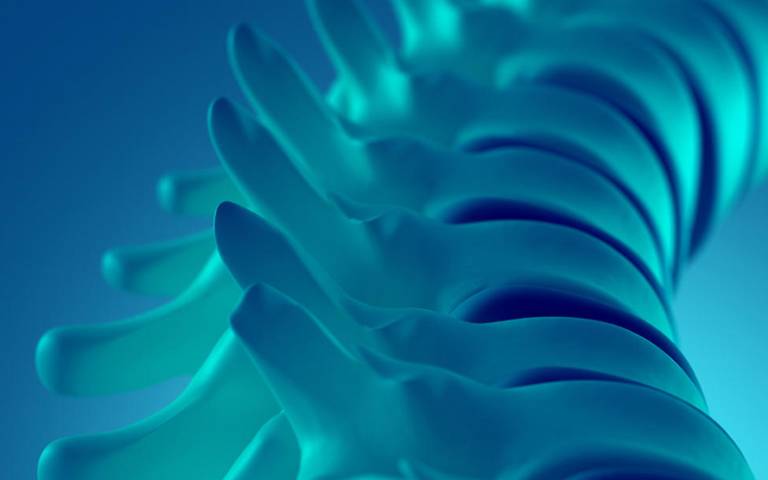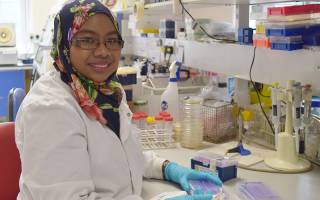2020 PhD successes: Biomaterials & Tissue Engineering
29 December 2020
Congratulations to all our Biomaterials & Tissue Engineering research postgrads who have passed their VIVAs this year.

Congratulations to all our research postgrads who have passed their VIVAs this year, despite the unusual circumstances. Within our Biomaterials & Tissue Engineering Department this included:
Alexandra Bridarolli, who was awarded her PhD for her project entitled: Multiscale approach in the assessment of nanocellulose-based materials as consolidants for painting canvases.
Primary supervisor, Dr Laurent Bozec, said: “The project that Alexandra worked on during her PhD was part of a huge innovation H2020 program (NanoRestart) focussing on the consolidation of canvas by nanocellulose.
“In her research, Alexandra demonstrated the importance of the ultra-scale mechanical interactions between the consolidation approaches and the existing canvas.
“This is extremely important for the conservation of easel-paintings as we cannot replace those art pieces . In fact, in her approach Alexandra treated the canvases with the same care needed to treat a patient in clinic.
“Alexandra, former winner of UCL 3-minute thesis (3MT) competition, has now moved state-side and is a research fellow at the Getty Institute In Los Angeles.”
Nazanin Owji, for her study: Development of 3D Printable Composites for Cranio-Maxillofacial Applications.
Primary supervisor, Professor Jonathan Knowles, said: “Nazanin undertook a PhD sponsored by The Restoration and Appearance of Function Trust (RAFT) to develop some new families of polymers for 3D printing of custom fit devices.
“This work also involved collaborative in vivo work and Nazanin visited Dankook University in South Korea to carry this work out.
“She has successfully published work from her thesis and she defended her thesis in May and is now about to embark on a new postdoctoral position, extending the work of her PhD and sponsored by UCL’s Therapeutic Acceleration Scheme.”
Papon Muangsanit, awarded his PhD for researching Aligned endothelial cell and Schwann cell structures in 3D hydrogels for peripheral nerve tissue engineering.
Primary Supervisor, Professor James Phillips, said: “Papon’s research focussed on nerve tissue engineering, in particular the construction of artificial tissue for peripheral nerve repair.
“The project took a novel approach through the incorporation of endothelial cell structures. These not only provided a way to help implanted tissues to become vascularised, but also directly provided guidance and support to regenerating nerves.
“In addition to exploring this novel approach to neural cell therapy Papon pioneered the use of a new type of tissue engineering technology that had not previously been used in nervous system repair, resulting in a collaborative international publication and an exciting new technology for scalable manufacture of engineered neural tissue.”
Richard Bartlett, for his project, Tissue Engineering & Regenerative Medicine to Repair the Spinal Cord.
Primary Supervisor, Professor James Phillips, said: “Richard’s research explored ways to improve cell therapy to treat spinal cord injury.
In particular, he developed new approaches using soft biomaterials to trap therapeutic cells at the injury site, to improve the survival and effectiveness of the implanted cells.
“An important part of this work focussed on matching the biomechanical properties of implanted materials to those of the host tissue, which yielded new information about the stiffness of soft hydrogels and CNS tissue.
"Richard also won the Cordwainer’s Prize for the best MB/PhD thesis and also won the Dean’s Research Prize in 2018, as well a personal Trainee & Professional Development Award from the Society for Neuroscience and various prestigious travel awards during his project.”
Nabih Alkhouri, for his work into Optimising Novel Dental Composites for Paediatric Patients.
Primary Supervisor, Professor Anne Young, said: “Nabih discovered a new dental composite that is able to penetrate and seal carious dentine and self-repair if fractured.
“Following Nabih’s work optimising the material, it was subsequently manufactured and packaged by Davis, Schottlander and Davis Dental Company.
“In a First-In-Human clinical trial, it successfully restored teeth that were considered beyond repair without need for drill, anaesthetic or any other tooth preparation or conventional composite bonding steps.
“Nabih’s work is currently being published to support CE marking and further clinical trials of his device.
“It also has the potential to solve many of the current issues arising with tooth restoration during the Covid-19 pandemic due to placement being very quick compared with a conventional composite restoration – and it also does not require the aerosol generating procedures needed for conventional composites placement that can enhance spread of the disease.”
Nabih is now employed in the paediatric department of the Eastman Dental Hospital.
 Close
Close




